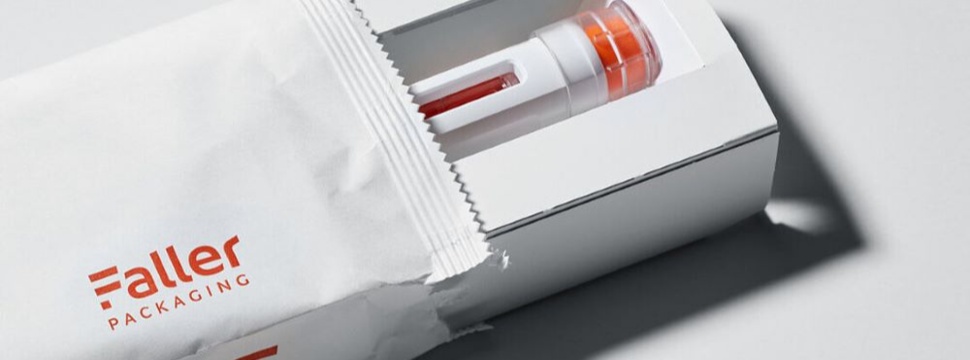Recyclable lightweight - Paper pouches serve as sustainable secondary packaging for pharmaceutical and healthcare products
News General news
Can medicines and medical devices be sold in paper pouches? This works well with groceries, and it could also be a sustainable solution in the pharmaceutical and healthcare industries. Faller Packaging has now developed paper pouches that could be an alternative to folding cartons.

Nikolaus Reichenbach, Director of Strategic Development at Faller Packaging, has a trained eye when it comes to sustainable packaging. His expertise also serves him well when he shops for groceries. As an environmentalist he gladly opts for items that are sold in paper bags. At work he is also concerned with packaging, but here the focus is on folding cartons. Reichenbach and his colleagues have been discussing possible uses for paper pouches as packaging for medicines. The idea drew attention at Faller Packaging and has taken a long trip through the company’s product innovation process.
Successful results
The innovation team first looked for a suitable paper pouch material. Then it carried out printing tests and perfected the finishing process with machine manufacturer Gerhard Schubert. Faller’s employees were on hand for this purpose with trays, pens and blister packs. Using the test machine, they packed the items in prototypes of the printed paper pouches. The primary aim of these tests was to make sure that the pouches complied with industry standards for conventional secondary packaging in terms of durability and functionality.
The results confirmed that the process was feasible, and cooperation with the material and manufacturing experts went well. “The way is now clear for developing a biodegradable, sealable and sustainable paper package for medicines,” says Marketing Manager Sarina Diebold. “And the best thing is that we can use it for a variety of applications while also complying with product protection standards.” Faller Packaging is planning to carry out additional production tests with Schubert in the future.
Paper pouches have a number of convincing advantages. Their low weight reduces the volume required for storage, transport and waste. Users can save up to 90 percent in CO2 emissions and optimise their carbon footprint, as confirmed by an independent life cycle assessment. Various kinds of paper, with and without additional coatings, are available. The pouches are sealable and manufactured to show if they have already been opened. This makes the use of other features such as tamper-evident labels unnecessary. They are recyclable and can be disposed of with waste paper after use.
Focus on customer needs
Nikolaus Reichenbach’s highly promising idea of using paper pouches for packaging medicines will be implemented step by step by the innovation team. The next step will be to meet with pharmacists and users of secondary packaging in order to discuss applications. Their feedback will play a key role in the agile product innovation process (PIP). Faller Packaging wants to ensure through direct dialog that the new packaging solutions satisfy the market’s requirements and offer genuine added value.
The environmentally friendly paper pouches are not yet being used on the market for pharmaceuticals and healthcare products. But this could soon change. “We’re open for talks. Interested parties are invited to get in touch with us to learn more about paper pouches and share their views with us,” says Sarina Diebold. “Our goal is to help companies achieve their sustainability goals. They should see this innovation as an opportunity.”
Packaging expert Nikolaus Reichenbach is delighted by the success of the feasibility study. Now customer feedback is important. If the packaging process and distribution also get a positive assessment, it won’t be long before the first medicines in paper pouches appear on the market.










